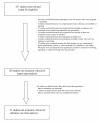Maternal substance use and integrated treatment programs for women with substance abuse issues and their children: a meta-analysis
- PMID: 20809957
- PMCID: PMC2942813
- DOI: 10.1186/1747-597X-5-21
Maternal substance use and integrated treatment programs for women with substance abuse issues and their children: a meta-analysis
Abstract
Background: The rate of women with substance abuse issues is increasing. Women present with a unique constellation of risk factors and presenting needs, which may include specific needs in their role as mothers. Numerous integrated programs (those with substance use treatment and pregnancy, parenting, or child services) have been developed to specifically meet the needs of pregnant and parenting women with substance abuse issues. This synthesis and meta-analysis reviews research in this important and growing area of treatment.
Methods: We searched PsycINFO, MedLine, PubMed, Web of Science, EMBASE, Proquest Dissertations, Sociological Abstracts, and CINAHL and compiled a database of 21 studies (2 randomized trials, 9 quasi-experimental studies, 10 cohort studies) of integrated programs published between 1990 and 2007 with outcome data on maternal substance use. Data were summarized and where possible, meta-analyses were performed, using standardized mean differences (d) effect size estimates.
Results: In the two studies comparing integrated programs to no treatment, effect sizes for urine toxicology and percent using substances significantly favored integrated programs and ranged from 0.18 to 1.41. Studies examining changes in maternal substance use from beginning to end of treatment were statistically significant and medium sized. More specifically, in the five studies measuring severity of drug and alcohol use, the average effect sizes were 0.64 and 0.40, respectively. In the four cohort studies of days of use, the average effect size was 0.52. Of studies comparing integrated to non-integrated programs, four studies assessed urine toxicology and two assessed self-reported abstinence. Overall effect sizes for each measure were not statistically significant (d = -0.09 and 0.22, respectively).
Conclusions: Findings suggest that integrated programs are effective in reducing maternal substance use. However, integrated programs were not significantly more effective than non-integrated programs. Policy implications are discussed with specific attention to the need for funding of high quality randomized control trials and improved reporting practices.
Figures
Similar articles
-
Maternal mental health and integrated programs for mothers with substance abuse issues.Psychol Addict Behav. 2010 Sep;24(3):466-74. doi: 10.1037/a0020139. Psychol Addict Behav. 2010. PMID: 20853932
-
Integrated programs for mothers with substance abuse issues: A systematic review of studies reporting on parenting outcomes.Harm Reduct J. 2012 Mar 19;9:14. doi: 10.1186/1477-7517-9-14. Harm Reduct J. 2012. PMID: 22429792 Free PMC article.
-
Recovery schools for improving behavioral and academic outcomes among students in recovery from substance use disorders: a systematic review.Campbell Syst Rev. 2018 Oct 4;14(1):1-86. doi: 10.4073/csr.2018.9. eCollection 2018. Campbell Syst Rev. 2018. PMID: 37131375 Free PMC article.
-
Parenting outcomes of parenting interventions in integrated substance-use treatment programs: A systematic review.J Subst Abuse Treat. 2018 Jun;89:52-59. doi: 10.1016/j.jsat.2018.03.005. Epub 2018 Apr 3. J Subst Abuse Treat. 2018. PMID: 29706173 Free PMC article.
-
Collaboration between child welfare and substance-abuse fields: combined treatment programs for mothers.J Pediatr Psychol. 2005 Oct-Nov;30(7):581-97. doi: 10.1093/jpepsy/jsi045. Epub 2005 Feb 23. J Pediatr Psychol. 2005. PMID: 16166247 Review.
Cited by
-
Coordinating Outpatient Care for Pregnant and Postpartum Women with Opioid Use Disorder: Implications from the COACHH Program.Matern Child Health J. 2019 May;23(5):585-591. doi: 10.1007/s10995-018-2683-y. Matern Child Health J. 2019. PMID: 30604105
-
Prenatal Substance Use: Exploring Assumptions of Maternal Unfitness.Subst Abuse. 2015 Sep 20;9(Suppl 2):1-4. doi: 10.4137/SART.S23328. eCollection 2015. Subst Abuse. 2015. PMID: 26448685 Free PMC article.
-
Support Services for Young Adults With Substance Use Disorders.Pediatrics. 2021 Jan;147(Suppl 2):S220-S228. doi: 10.1542/peds.2020-023523E. Pediatrics. 2021. PMID: 33386325 Free PMC article.
-
Levels and predictors of participation in integrated treatment programs for pregnant and parenting women with problematic substance use.BMC Public Health. 2019 Feb 6;19(1):154. doi: 10.1186/s12889-019-6455-4. BMC Public Health. 2019. PMID: 30727978 Free PMC article.
-
Development of a Blueprint for Integrated Care for Vulnerable Pregnant Women.Matern Child Health J. 2022 Mar;26(3):451-460. doi: 10.1007/s10995-021-03340-y. Epub 2022 Jan 9. Matern Child Health J. 2022. PMID: 35000072 Free PMC article.
References
-
- Ahmad N, Poole N, Dell C. In: Highs & Lows: Canadian Perspectives on Women and Substance Use. Poole N, Greaves L, editor. Toronto, ON, Canada: Centre for Addiction and Mental Health; 2007. Women's substance use in Canada. Findings from the 2004 Canadian Addiction Survey; pp. 5–19.





